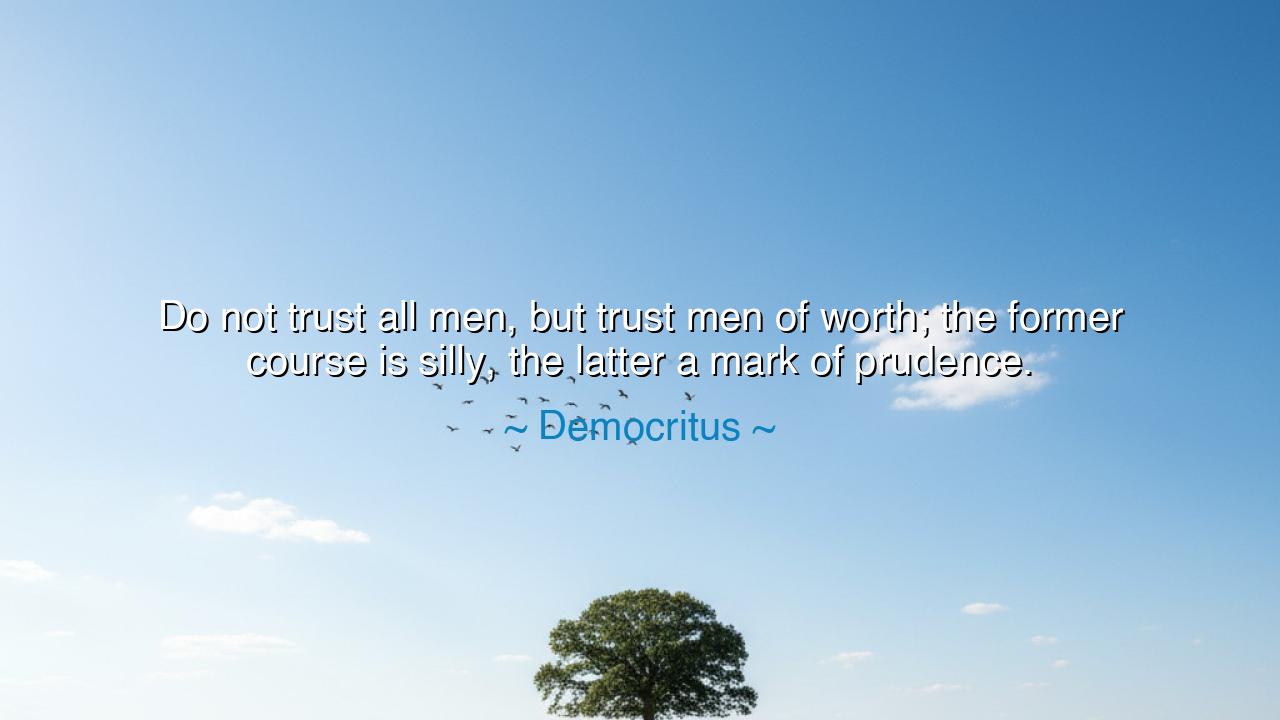
Do not trust all men, but trust men of worth; the former course
Do not trust all men, but trust men of worth; the former course is silly, the latter a mark of prudence.






Hear the voice of Democritus, the laughing philosopher of ancient Greece, who spoke wisdom clothed in simplicity: “Do not trust all men, but trust men of worth; the former course is silly, the latter a mark of prudence.” In these words lies not cynicism, but clarity. For trust is the golden thread that binds human beings together, yet when given without discernment, it becomes a noose that strangles. Democritus teaches us that to trust all indiscriminately is folly, but to recognize and entrust oneself to men of integrity is the mark of true wisdom.
The heart of the saying rests upon the nature of trust. It is the invisible coin of all relationships—without it, there can be no friendship, no commerce, no governance, no love. Yet it is fragile, and easily betrayed. Many in their eagerness to believe in the goodness of all fall into the trap of naïveté, giving their confidence to the unworthy, only to be deceived, wounded, or ruined. This is what Democritus calls “silly,” for it is not kindness but carelessness to hand over your trust without testing the soul who receives it.
But he does not command us to abandon trust altogether. No, he urges us to place it wisely, in men of worth—those proven by character, deeds, and constancy. To trust such men is not weakness but strength; it is not blind but deliberate. For just as one does not cast seed upon stony ground but upon fertile soil, so too must trust be planted in those who will nurture it and cause it to flourish. Prudence, therefore, is not the enemy of trust, but its guardian.
History gives us many mirrors of this truth. Recall Julius Caesar, who trusted Brutus, a man he believed to be noble and loyal. Yet Brutus, swayed by ambition and the whispers of conspirators, betrayed him. Caesar’s downfall reminds us of the peril of misplaced trust. Contrast this with Alexander the Great, who entrusted his campaigns to generals like Parmenion and Hephaestion, men tested in battle and proven in loyalty. His victories were not his alone, but the fruit of trust wisely bestowed upon men of worth.
Nor is this lesson confined to rulers and conquerors. Consider the life of Abraham Lincoln. Surrounded by rivals and critics, he nevertheless built a cabinet of men strong in character, many of whom had once opposed him. He trusted not flattery, but integrity and competence. His ability to discern and to place confidence in those of worth became one of the pillars of his enduring leadership during the storm of civil war. His prudence shines as an example for all who would lead and live with wisdom.
The lesson, O listener, is both stern and merciful: trust is necessary, but it must be discerning. To trust all is folly; to trust none is despair. The middle path is the way of wisdom—testing, discerning, weighing the character of those around us, and then entrusting ourselves only to the worthy. In this balance lies peace and strength.
Practical is this counsel: in your daily life, do not surrender your confidence to every smooth word or smiling face. Look for deeds, not promises; for consistency, not charm. Ask: has this person shown honor when it cost them? Have they proven reliable in small things before being entrusted with great things? And when you find such a person, do not withhold your trust, for mutual trust is the foundation of friendship, love, and society itself.
So remember the wisdom of Democritus: “Do not trust all men, but trust men of worth.” Guard your heart from folly, but do not close it in fear. To trust with prudence is not only a mark of wisdom, it is the very path to strength, community, and the flourishing of life. For in a world of shadows, discernment is the lamp that guides us to those whose worth can bear the weight of our trust.






AAdministratorAdministrator
Welcome, honored guests. Please leave a comment, we will respond soon